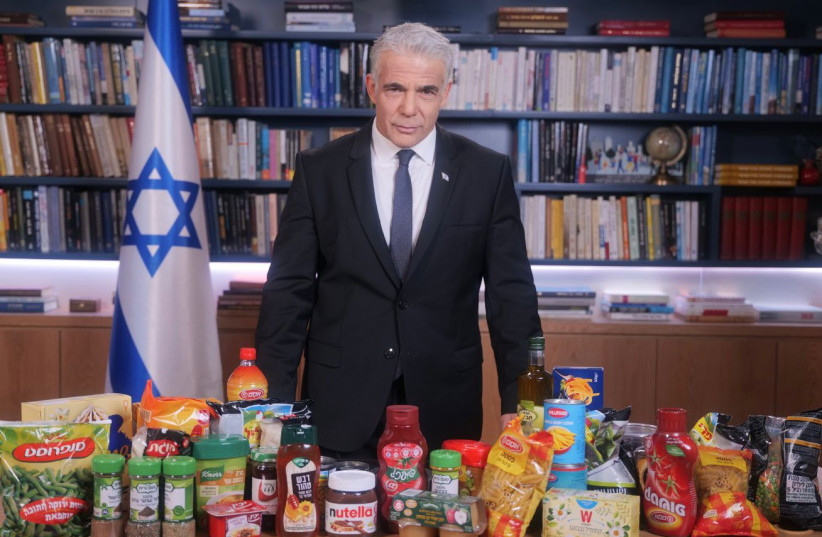While Israel’s state of food security is decent, there are several variables that, unless managed properly, could severely impact its residents’ access to baseline nutrition.
A new report from the The Shoresh Institution for Socioeconomic Research has identified the increasing dependence on international food imports as a primary threat to the state’s food security, exacerbated by the country’s high population growth.
The global factors of climate change, international conflict and supply chain disruption also pose significant challenges that need to be overcome in order to ensure that as many Israelis as possible have access to enough food.
According to the report’s author, Professor Ayal Kimhi, the government’s approach to lowering the cost of living by reducing import tariffs on produce is misguided. He posits that such a move only reinforced Israel’s reliance on imported goods, which greatly increases the risk of disaster in the event of disrupted import supply.
“It may have some benefits in the short run, but it may also increase the risks to food security in the longer run,” said Kimhi. “It could be [supply] disruptions, it could be higher prices in the future due to climate change and other factors; if we rely on imports and do not balance it with local production, we may expose ourselves to higher risk.”
It could be [supply] disruptions, it could be higher prices in the future due to climate change and other factors; if we rely on imports and do not balance it with local production, we may expose ourselves to higher risk.”
Prof. Ayal Kimhi

Don’t bet the farm - we need that
As an alternative to imports, Kimhi recommends reinvigorating Israel’s agricultural development and production – something that has waned in the past few decades as the hi-tech industry has taken over as the primary economic powerhouse.
“Agriculture cannot compete with hi-tech or food-tech, but if we want to maintain a portfolio of food sources, it has to include a significant fraction of local production, which is important to stabilize supply. If the international value chain is not functioning at some point in time due to global issues, then you need local production to make up for that,” Kimhi explained.
Therefore, he said, what’s critical is strengthening the agriculture sector in such a way that it doesn’t depend on subsidies but is, in fact, profitable.
“It could be profitable if we invest more in research and development, and improve the technological level of farms and provide the farms with [prospects]. Right now, all the signals that are provided by the government are that agriculture is not important. And it is, it should be clear that agriculture is here to stay,” Kimhi said.
Lots of babies need lots of food
Kimhi noted that Israel’s high birth rate is also something to keep a close eye on, as it can act to undermine what little agricultural progress Israel currently has.
“The direct effect of the birth rate is just having more mouths to feed. The indirect effect is that the population growth also reduces the ability of the agriculture sector to provide sufficient food for the population, because you’re losing farmland [to make way for] the development of residential neighborhoods, commercial centers, roads and other infrastructure projects,” he said, noting that these factors put even greater pressure on the reliance on food imports.
Don’t lower prices, raise low incomes
From a food security perspective, lowering the cost of food may not be the correct approach to ensuring adequate nutrition for all. According to a study from the Shoresh Institution, a standard basket of nutrient-adequate foods - or even a basket of healthy foods - is cheaper in Israel than it is in most other OECD countries.
“Food prices are not really high here. There is some public perception that it is, but that's wrong,” said Kimhi. “The main difference between the ability of low income families to purchase healthy food with respect to other families is simply income inequality.”
With this in mind, Kimhi posits that it is more beneficial to focus on increasing the income of society’s less wealthy demographics, thereby guaranteeing their ability to purchase enough food while saving government resources.
“If you lower prices, that's going to affect all families. So it's going to take a much larger effort to accomplish. Whereas in focusing on the income of low income families, you really target the money in the place where it's most needed,” he explained.
Can we get an authority figure over here?!
The report calls for the establishment of a public authority that will “formulate a national food security strategy, break it down into achievable goals and applicable policy measures, and to supervise their implementation.”
At present, no such authority exists within the government. In June, an agreement was signed by Welfare Minister Meir Cohen that would see the government’s implementation of a National Food Security Initiative pilot program. The program would distribute a monthly NIS 500 stipend to targeted households in need, and offer classes on personal finance.
According to Kimhi, this program “solves the immediate problem of the families who are really at the bottom of the distribution of purchasing ability.”
However, it does not include the establishment of a public body that would manage and oversee food security efforts; without that, the future of the initiative relies mainly on the whim of whoever the current welfare minister happens to be.
“It doesn’t make sense that every time the welfare minister changes – and it happens too often in Israel – that the country’s food security policy should also change,” Kimhi said. “We need a public body with authority and with a budget that will carry from year to year, not dependent on all kinds of political manipulations. We need some stability.”
